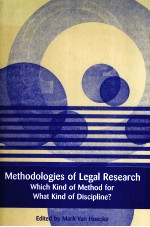

Methodologies of Legal ResearchPDF电子书下载
- 电子书积分:11 积分如何计算积分?
- 作 者:Mark Van Hoecke
- 出 版 社:Hart Publishing
- 出版年份:2222
- ISBN:9781849461702;1849461708
- 页数:294 页
1. Legal Doctrine: Which Method(s) for What Kind of Discipline?&Mark Van Hoecke 1
Ⅰ. Historical Developments 1
Ⅱ. What Kind of Discipline is Legal Doctrine? 4
Ⅲ. Which Methodology for Legal Research? 11
Ⅳ. Conclusion 17
2. The Method of a Truly Normative Legal Science&Jaap Hage 19
Ⅰ. Preliminaries 20
Ⅱ. The Possibility of a Normative Science 28
Ⅲ. The Method of a Truly Normative Legal Science 40
Ⅳ. Conclusion 43
3. Explanatory Non-Normative Legal Doctrine. Taking the Distinction between Theoretical and Practical Reason Seriously&Anne Ruth Mackor 45
Ⅰ. Introduction 45
Ⅱ. Theoretical and Practical Reason 46
Ⅲ. Explanatory Legal Doctrine 48
Ⅳ. Normative Legal Doctrine 58
Ⅴ. Conclusion 69
4. A World without Law Professors&Mathias M Siems 71
Ⅰ. Introduction 71
Ⅱ. Legal Training and Education 72
Ⅲ. Legal Research and Writing 78
Ⅳ. Analysis: What Next ? 85
5. Open or Autonomous? The Debate on Legal Methodology as a Reflection of the Debate on Law&Pauline C Westerman 87
Ⅰ. Introduction 87
Ⅱ. The Problem of the Lacking Third 88
Ⅲ. Legal System as Theoretical Framework 90
Ⅳ. Legal Doctrine and Legal Science 94
Ⅴ. The Quest for Ongoing Abstraction 95
Ⅵ. Empty Autonomy 97
Ⅶ. Revenge of Reality 101
Ⅷ. The Need for an Empirical Orientation 105
Ⅸ. An Empirical Legal Doctrine? 108
6. Methodology of Legal Doctrinal Research: A Comment on Westerman&Jan Vranken 111
Ⅰ. Introduction 111
Ⅱ. The Identity of Subject and Theoretical Framework: Four Objections 114
Ⅲ. Methodological Consequences 118
7. The Epistemological Function of ‘la Doctrine’&Horatia Muir W 123
Ⅰ. On the Choice, as a Topic, of the Epistemological FunctionPlayed Out in French Legal Tradition by ‘la Doctrine’ 123
Ⅱ. The Current Debates over the Existence and Future of ‘la Doctrine’ and why they are Significant 125
Ⅲ. How the Emergence of ‘la Doctrine’ is Linked to the Decline of the Code and the Massification of ‘la Jurisprudence’ 126
Ⅳ. How the Changing Relationship between Law and the other Social Sciences is Relevant to the Rise of ‘la Doctrine’ and to the Subsequent Shaping of Legal Knowledge 128
Ⅴ. Why ‘la Doctrine’ is Threatened Today in its Interpretative Function 129
Ⅵ. Why the Current Crisis may be for the Better- and may be Good for Comparative Legal Research 131
8. Maps, Methodologies and Critiques: Confessions of a Contract Lawyer&Roger Brownsword 133
Ⅰ. Introduction 133
Ⅱ. An Ideological Understanding of Adjudication and of Contract Law 135
Ⅲ. The Rationality of Contract Law 137
Ⅳ. The Underlying Ethic of Contract Law 139
Ⅴ. The Fit between Doctrine and Business Organisation 143
Ⅵ. The Consent-Based Nature of Contractual Obligation 145
Ⅶ. The Mission of Protecting Reasonable Expectations 146
Ⅷ. Contract and the Larger Regulatory Environment 148
Ⅸ. Conclusion 152
9. Legal Research and the Distinctiveness of Comparative Law&John Bell 155
Ⅰ. Introduction: Legal Research as a Normative Social Science 155
Ⅱ. Hermeneutic Approach to Legal Research 158
Ⅲ. The Institutional Character of Law 161
Ⅳ. The Interpretative Character of Law 164
Ⅴ Implications for Comparative Law 167
Ⅵ . Conclusion 175
10 . Does One Need an Understanding of Methodology in Law Before One Can Understand Methodology in Comparative Law?&Geoffrey Samuel 177
Ⅰ. The Problem of Interdisciplinarity 178
Ⅱ. Methodology and the Status of Comparative Law 182
Ⅲ. Methodology and Epistemology in the Social Sciences 188
Ⅳ. Methodology and Epistemology in Law 192
Ⅴ. Positivism (Causality) Versus Hermeneutics 194
Ⅵ. Positivism (Causality) Versus Dialectics 198
Ⅶ. Positivism versus Actionalism and Objectification 200
Ⅷ. Paradigm Authoritarianism Versus Comparative Studies 205
11. Comparative Law, Legal Linguistics and Methodology of Legal Doctrine&Jaakko Husa 209
Ⅰ. Introduction 209
Ⅱ. Background of Functionalism 212
Ⅲ. From Rabel to Zweigert and Kotz 215
Ⅳ. Legal Languages and Functionalism 223
Ⅴ. Conclusion 227
12. Doing What Doesn’t Come Naturally. On the Distinctiveness of Comparative Law&Maurice Adams 229
Ⅰ. ‘Doing’ Law is Immutably Comparative 229
Ⅱ.‘And Yet it Moves!’ 230
Ⅲ. Explanatory Comparative Law and Interdisciplinarity 235
Ⅳ To Conclude 239
13. Promises and Pitfalls of Interdisciplinary Legal Research: The Case of Evolutionary Analysis in Law&Bart Du Laing 241
Ⅰ. Introduction 241
Ⅱ. Contemporary Evolutionary Approaches to Human Behaviour and Evolutionary Analysis in Law 244
Ⅲ. Taxonomising Evolutionary Analyses in Law: Three Questions 248
14. Behavioural Economics and Legal Research&Julie De Coninck 257
Ⅰ. Introduction 257
Ⅱ. Behavioural Economics 258
Ⅲ. Behavioural Law and Economics 262
Ⅳ. Closing Remarks 275
15. Theory and Object in Law: the Case for Legal Scholarship as Indirect Speech&Bert Van Roermund 277
Ⅰ. Legal Scholarship Pre-Determined by the Law it Investigates? 278
Ⅱ. Theoretical Language as Meta-Language? 282
Ⅲ. Some Implications 284
Index 287
- 《铜提取冶金》(美)Mark E.Schlesinger 2017
- 《最后之战》(荷)达安·赫马·范·福斯(Daan Heerma Van Voss)著 2019
- 《从部落到国家 人类社会的崛起、繁荣与衰落》(美)马克·W.莫菲特(MARK W.MOFFETT)著 2020
- 《骨骼肌肉MRI/CT断层解剖 第4版》MARK W.ANDERSON,MICHAEL G.FOX原著;韩鸿宾主译 2019
- 《血管医学 《BRAUNWALD心脏病学》姊妹卷 第2版》(美)马克·A.克里杰(Mark A.Creager),(美)约书亚·A.贝克曼(Joshua A.Beckman),(美)约瑟夫·洛斯卡尔佐(Joseph Loscalzo)原著;王宏宇主译 2019
- 《将模糊理论说清楚:透析无所不在的“虚假的明确”》(英) 纪斯·迪姆特 (Deemter Kees Van)著;李隆生,张逸安译 2012
- 《网路上不教的课 全方位的职场教战手册》(美)马克·麦考梅克(Mark H.McCormack)著;李芸玫,孙梅君译 2002
- 《裂缝性油藏工程基础 上》T.D.VAN GOLF-RACHT著;沈志成,仲雍,张纪易,刘敬奎译;仲雍校 1985
- 《波浪行销 想大卖先学会与风作浪 用虚实整合的直效手法,让广大群众帮你一起做生意》Mark Davies & Tina Catling著;高子梅译 2012
- 《人员素质测评 第3版》(中)肖鸣政;(英)Mark Cook编著 2013
- 《非线性量子力学》庞小峰编著 2009
- 《爱与意志》(美)罗洛·梅著;冯川译 1998
- 《牛虻》(英)艾·丽·伏尼契著;亚贤译 1995
- 《自杀风险管理手册》(加)库奇,(加)切希尔著 2011
- 《柴油发动机系统设计》(美)辛千凡著;(美)辛千凡译 2015
- 《WIESEL骨科手术技巧 足踝外科》(美)Sam W. Wiesel总主编;(美)Mark E. Easley主编;张长青总主译 2015
- 《永续生活 16个家的创想物语》(日)意迪著;林叶,袁璟译 2014
- 《创伤骨科》(美)威塞尔主编;张长青总主译 2015
- 《WIESEL骨科手术技巧 成人重建外科》(美)威塞尔(Sam W. Wiesel)总主编;(美)Javad Parvizi,Richard H. Rothman主编;张长青总主译 2015
- 《结直肠癌规范化诊疗 国际进展与中国实践荟萃》陈功,邱萌,张俊主编;袁瑛,黄鼎智副主编 2015
